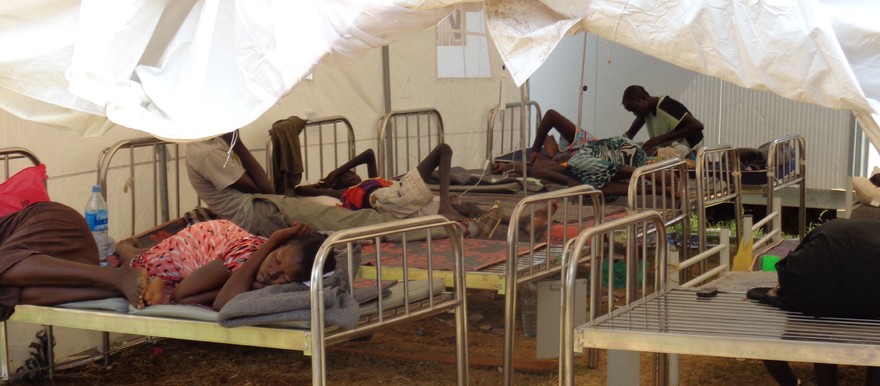The main hospital of the United Nations Mission in South Sudan (UNMISS) is overstretched and unable to cope adequately with newly referred patients, medical sources told Radio Tamazuj.
Colonel Phok Chanthy, commanding officer at the Cambodian Level II Hospital, said that the medical personnel at his hospital are tired, all the beds are full, there are not enough bed sheets, and there are shortages of painkillers and antibiotics.
He appealed for supplies for the hospital including clothes for the patients, mosquito nets, plastic drinking cups, crutches and medicines.
As of Wednesday there were 86 patients at the hospital, including 29 admitted that day, and on Thursday the number rose to nearly 100. Since the crisis began in mid December the hospital treated hundreds of gunshot victims as well as sick people from the internally displaced persons camp within the base.
Almost all of the 14,000 people living inside the sprawling UN base in the Tong Ping area of Juba are Nuer, and they are now cut off from health care services outside of the camp out of fear of being harassed, arrested or killed.
Primary health care in the Tong Ping camp is being provided by international organizations including Doctors Without Borders and International Medical Corps, while the UN military hospital is considered the referral hospital. The kinds of cases seen at the referral hospital include malaria, childbirths, and gun shots.
Referrals
Colonel Chanthy said the UN military hospital is struggling to cope with the existing caseload and the continuous influx of patients. He said many of the referred patients are given medicines and then sent back to the IDP camp.
The UN hospital also has difficulty discharging patients who are ready to be discharged, since there is nowhere else for them to go. More than 20 patients should be discharged but have not, according to the hospital’s commanding officer.
Speaking with Radio Tamazuj, a doctor working for Doctors Without Borders (MSF) at a primary health care clinic in the IDP camp on the base said the UN hospital has turned back some of the patients referred by MSF. He pointed out two patients whom the UN hospital was unable to admit – a sick pregnant woman and a woman with a chronic illness.
Another MSF official explained that neither their own clinic in the camp nor the UN hospital have the capacity to treat chronic illnesses such as tuberculosis or HIV/AIDS. He explained that MSF does not treat tuberculosis as part of its emergency response and that the national health ministry has not provided any tuberculosis drugs to the people within the camp.
According to the doctor at the MSF clinic, he saw several cases of tuberculosis but he was unable to do anything to treat them. Likewise, the chief of the UN hospital said that he saw many suspected cases but tuberculosis testing was impossible at the hospital owing to lack of the right testing equipment.
Wounds of war
Admitted patients in the hospital are lying on the floor and outside on mattresses, while others are sitting in corridors waiting to be seen by doctors.
One patient resting outside on a mattress identified himself as Baboya William, an SPLA soldier and radio operator. He said that he was hit by several bullets and lost part of his upper arm in an explosion.
William recalled that he was at the Bor front when he was wounded on Tuesday evening. After being hit he fled to the bush, where he slept bleeding throughout the night. He remembers being taken to a car but doesn’t know how he got to the hospital because passed out during the journey.
Gogo, an Ethiopian shopkeeper, waited in the front corridor with his head wrapped in bandages and his face swollen. He said he was injured when he was caught in the middle of a brawl between Dinka and Nuer men inside the UN compound in Bor. While trying to flee the melee he was knocked on the head with a glass beer bottle.
Many other young men lined the corridors with bandages, splints or bags of fluid draining from their bodies, fresh from the fighting in Jonglei. With no ceasefire and no sign of the displaced population leaving, the wounded and sick are expected to continue to arrive.
Photos: Patients at the Cambodian Level II Hospital at UNMISS Tong Ping Base in Juba, 9 January 2014 (Radio Tamazuj)
Related coverage:
ICRC president says ‘can’t cope’ with influx of wounded in South Sudan (8 Jan.)




